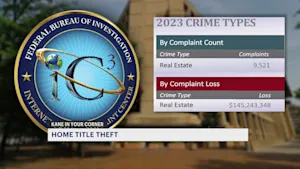KIYC: Do NJ’s primary ballots allow power brokers to pick winners instead of voters?
Some political experts say the system allows county party organizations to design the ballot, placing its preferred candidates in one line.
Share:
More Stories
0:22

Bill Clinton is out of the hospital after being treated for the flu
2ds ago0:17

Spokesperson: Former President Bill Clinton in hospital for testing and observation
2ds ago10:27

Power & Politics: A look back at 2024's biggest political stories
4ds ago
President Biden signs bill that averts government shutdown and brings a close to days of Washington upheaval
5ds ago0:36

FAA to grant flight restrictions over NY's 'critical infrastructure sites' amid drone activity
6ds ago10:04

Power & Politics: 1:1 with Rep. Andrew Garbarino; Gov. Hochul’s approval numbers
11ds ago0:22

Bill Clinton is out of the hospital after being treated for the flu
2ds ago0:17

Spokesperson: Former President Bill Clinton in hospital for testing and observation
2ds ago10:27

Power & Politics: A look back at 2024's biggest political stories
4ds ago
President Biden signs bill that averts government shutdown and brings a close to days of Washington upheaval
5ds ago0:36

FAA to grant flight restrictions over NY's 'critical infrastructure sites' amid drone activity
6ds ago10:04

Power & Politics: 1:1 with Rep. Andrew Garbarino; Gov. Hochul’s approval numbers
11ds agoWhen New Jersey residents vote on primary day in June, most will use a ballot unlike those seen anywhere else in the country. It’s a ballot some say allows power brokers, not voters, to decide who wins.
“I don't think it's unconstitutional, I know it's unconstitutional,” says political scientist Gene Mazo, one of several people suing in hope of getting the ballots thrown out.
What Mazo is referring to is a system that allows county party organizations to design the ballot, placing its preferred candidates in one line. The line system has been challenged several times in court. The most recent lawsuit was just filed by Rep. Andy Kim (D – Moorestown), who contends the line system favors his opponent, New Jersey first lady Tammy Murphy.
The Camden County primary ballot from 2018 is a good example of why some oppose the line. The county Democratic committee’s approved candidates are easy to find; all are in column two. But if a voter had wanted to cast a vote for someone other than incumbent Rep. Donald Norcross (D-Camden) in the race for Congress, they would have had to look all the way over on column 9, skipping over six blank squares. It’s a placement New Jersey political analysts refer to as “Ballot Siberia.”

“History suggests it's an incredibly powerful force,” says Julia Sass Rubin, a political science professor with the Bloustein School of Planning and Public Policy at Rutgers University. Her research shows that in the past 20 years, New Jersey incumbents running on the line finished with a record of 206 wins and only three losses. Those running off the line had a losing record, with nine wins and 10 losses.
“It distorts the outcomes,” Sass Rubin says. “I think that's a bad thing. I think ballots should not influence how you vote.”
Even powerful politicians have a hard time beating the system. In 2020, Sen. Cory Booker (D – New Jersey) wanted to support fellow candidate, Brigid Callahan Harrison (D- Longport) for Congress. Harrison was running off the line, so Booker moved off the line in Atlantic County, so his name could be placed directly over hers. It didn’t work. Harrison still lost. Booker won but with an unusually low number of votes. Twenty percent of voters cast no ballot at all for Senate. Sass Rubin isn’t surprised. After Booker had his name moved, the party line had a blank space for the Senate race, and she says voters are conditioned to look no further.

Some say the system isn’t all bad. “I think the line has been a moderating influence,” says Micah Rasmussen, director of the Rebovich Institute for New Jersey Politics at Rider University. While Rasmussen believes the system is sometimes abused, he says allowing parties to signal to voters who they believe are the best candidates has also helped New Jersey avoid the more extreme candidates and bitter partisan divides that have plagued other states.
“I think the line does put the parties in a position where they can sort of weed out and not recommend the candidates who don't match the profile of the party,” Rasmussen says.
Sass Rubin disagrees. “It's not the parties that are picking the candidates, it's a handful of people,” she says. “I think most people would prefer to make that decision for themselves.”
Do you know a story that needs to be investigated? Here’s how you can get Kane in Your Corner.
More from News 12
1:39

Officials warn residents to be aware of illegal donation bins
1:45

Nassau police: Woman fatally stabbed outside West Hempstead restaurant
1:29

Suffolk police: Man found dead in Lindenhurst home
1:38

Family of woman whose body was found in suitcase begs for answers about her death
3:44

Between the lines: Investigation reveals alleged publishing scandal impacting authors across the tri-state, nation
2:07
